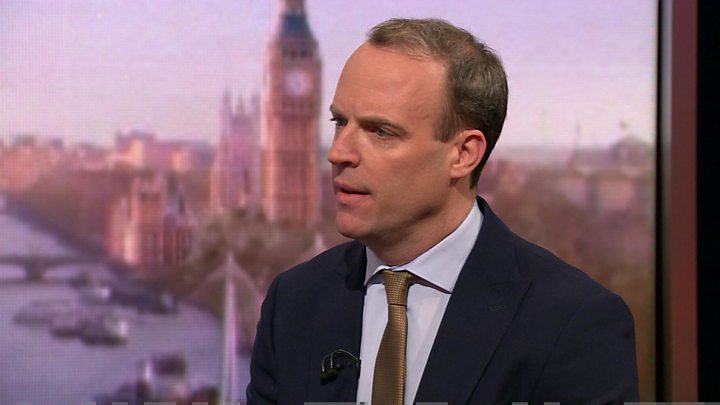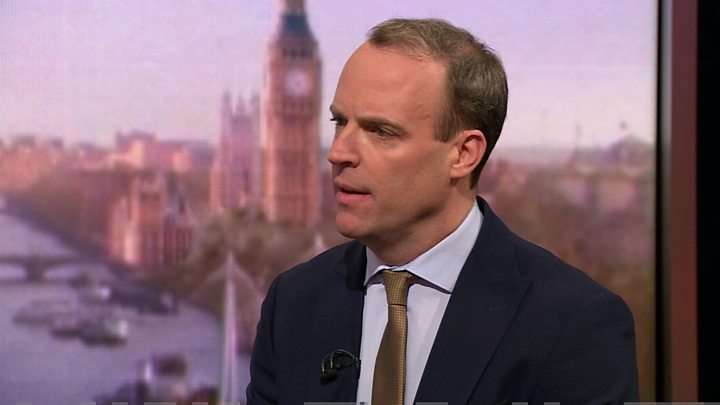Qasem Soleimani: Raab urges Iran to take diplomatic route amid tensions
The foreign secretary says the UK wants to avoid “a major war” after the US killing of Qasem Soleimani. …


Media playback is unsupported on your device
Foreign Secretary Dominic Raab has urged Iran to “take a diplomatic route” to reduce tensions with the West and come in “from the international cold”.
It comes amid heightened tensions in the Middle East following the US killing of Iran’s top military leader, Qasem Soleimani, in Iraq.
Mr Raab told the BBC the US “had a right to exercise self-defence”.
He said the UK understood “why they did it” but now wanted to “de-escalate tensions” and avoid “a major war”.
It comes as Royal Navy warships have been ordered to escort British-flagged vessels in the Persian Gulf.
There are fears Iran will seek revenge for the death of Soleimani, who was killed in a US drone strike in Baghdad, Iraq on Friday.
Meanwhile, Prime Minister Boris Johnson is due to return to the UK after a 12-day holiday and will talk to foreign leaders in the coming days.
The killing of Soleimani marks a major escalation in tensions between the US and Iran, with Tehran vowing to avenge his killing.
US President Donald Trump tweeted that the US will strike 52 Iranian sites “very fast and very hard” if Tehran follows through with its vow of revenge.
‘Nefarious actions’
Speaking to the BBC’s Andrew Marr programme on Sunday, Mr Raab rejected the idea that the US assassination of Soleimani was an act of war, adding: “Iran has for a long period been engaged in menacing, de-stabilising activities.”
Pressed on whether the killing was legal, Mr Raab said: “My view is – and the operational assessment has been done by the Americans – is that there is a right of self-defence.
“It was General Soleimani’s job description to engage proxies, militias across not just Iraq but the whole region, not just to destabilize those countries but to attack Western countries… In those circumstances the right of self-defence clearly applies.”
Mr Raab said he first became aware of the killing of Soleimani “as it happened” and spoke to US counterpart Mike Pompeo – who he will meet for pre-arranged talks in Washington this week – on Friday.
Challenged on whether it could have helped the UK to be warned about the airstrike in advance, Mr Raab said: “I’m not sure it would have made the kind of wholesale difference that you’re suggesting.”
Mr Raab added the “important thing now is to de-escalate the tensions and try and restore some stability” – while trying to contain Iran’s “nefarious actions”.
“We also need to see that there’s a route, a door left ajar for a diplomatic solution so that when the leadership in Tehran wake up to their options, they understand there is a positive route through for them.”
Asked about the criticism over Mr Johnson being on holiday during the recent developments, Mr Raab said he had been “in constant contact with the prime minister over the Christmas break on a whole range of foreign policy issues”.
Speaking on Sky’s Sophy Ridge programme, shadow foreign secretary Emily Thornberry accused Mr Johnson of “sunning himself” and “not paying attention” to the recent developments.
“We’ve had three Cobra meetings where Mark Sedwill, the chief civil servant, has had to chair it because the prime minister hasn’t been available,” she said.
She also said the US killing was “reckless” and marked a “major lurch towards war”.
Defence Secretary Ben Wallace said HMS Montrose and HMS Defender will accompany UK-flagged ships through the Strait of Hormuz, as they did between July and November following the seizure of a British-flagged tanker by Iran.
He said he had spoken to his US counterpart, Mark Esper, on Friday and urged all parties to de-escalate the situation.
But Mr Wallace added: “Under international law the United States is entitled to defend itself against those posing an imminent threat to its citizens.”
Mr Johnson is expected to return to the UK later after spending almost two weeks on the Caribbean island of Mustique.
He has yet to speak publicly about the US airstrike or subsequent threats from Iran.
Outgoing Labour leader Jeremy Corbyn renewed his criticism of the PM for not cutting short his holiday and called for an urgent meeting of the Privy Council – the group that advises the Queen – over the airstrike.
On Sunday, a crowd of more than 100 people waving Iranian and Iraqi flags protested against the killing of Soleimani outside the US embassy in London, with chants aimed at Mr Johnson and Mr Raab.
‘Remain vigilant’
Meanwhile, former Foreign Office minister Alistair Burt suggested the UK was “good at diplomacy” and could offer a “back channel” to forge a way forward for diplomatic talks.
“We have good people in the region who understand it very well,” he told Piernaar’s Politics programme, adding: “There’s a respect for the United Kingdom which is across the board and we have been engaging with Iran.”
Mr Pompeo had criticised America’s European allies for not being “helpful” in the wake of the assassination. However, he later said in a tweet that he was “thankful that our allies recognise the continuing aggressive threats posed by the Iranian Quds Force”.
Mr Raab is expected to meet his French and German counterparts before travelling to the US capital on Thursday.
Following the airstrike, the Foreign Office has hardened its travel advice for Britons in Iraq and Iran.
In its advice, published on Saturday, the Foreign Office said there is a risk that British or British-Iranian dual nationals “could be arbitrarily detained or arrested in Iran”.
“The criminal justice process followed in such cases falls below international standards,” it said.
The Foreign Office also said alerts for other parts of the Middle East were being increased, with calls for citizens to “remain vigilant” in nations including Afghanistan, Israel, Lebanon, Saudi Arabia and the United Arab Emirates.
It advised people to keep up to date with developments via the media and its own travel advice.
It comes as the US has pledged to send 3,000 extra troops as a precaution. The UK has 400 troops based in the Middle East and works alongside US forces in the region.
The US-led international coalition against the Islamic State group – Combined Joint Task Force, Operation Inherent Resolve – said it was suspending its training with partners and its support of their operations against the terror group.
Instead, its focus was on protecting Iraqi bases that host coalition troops, it said in a statement.




